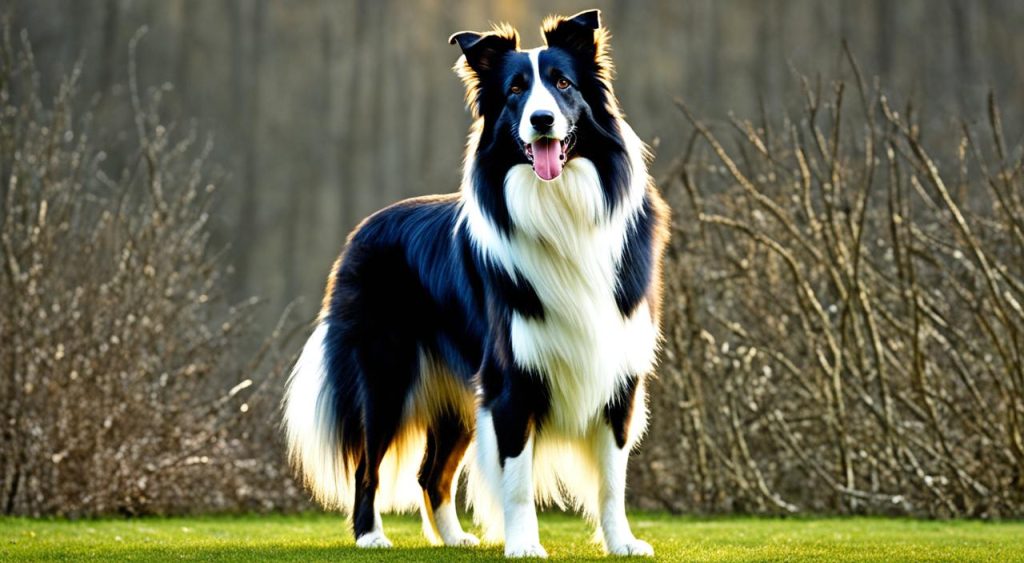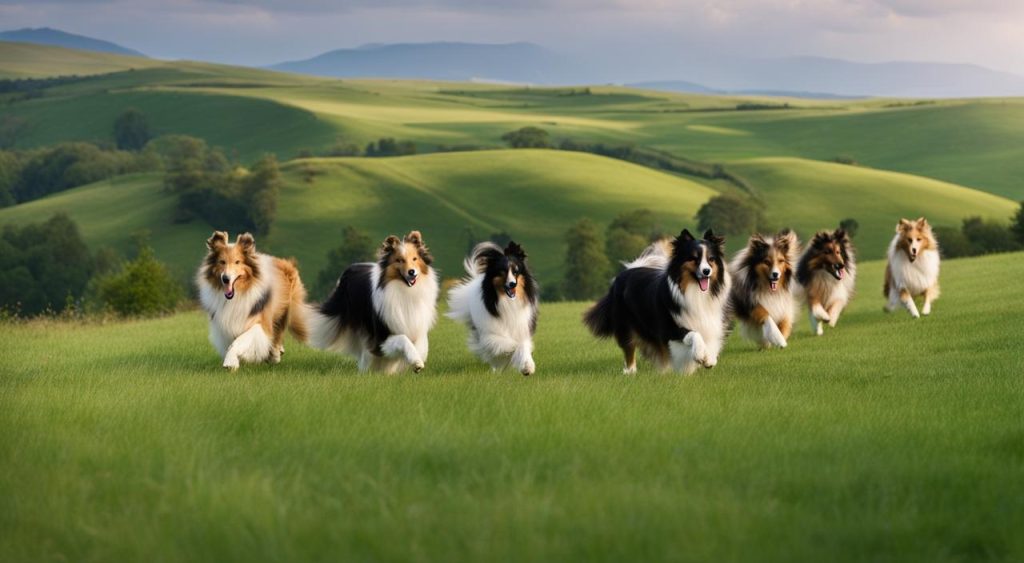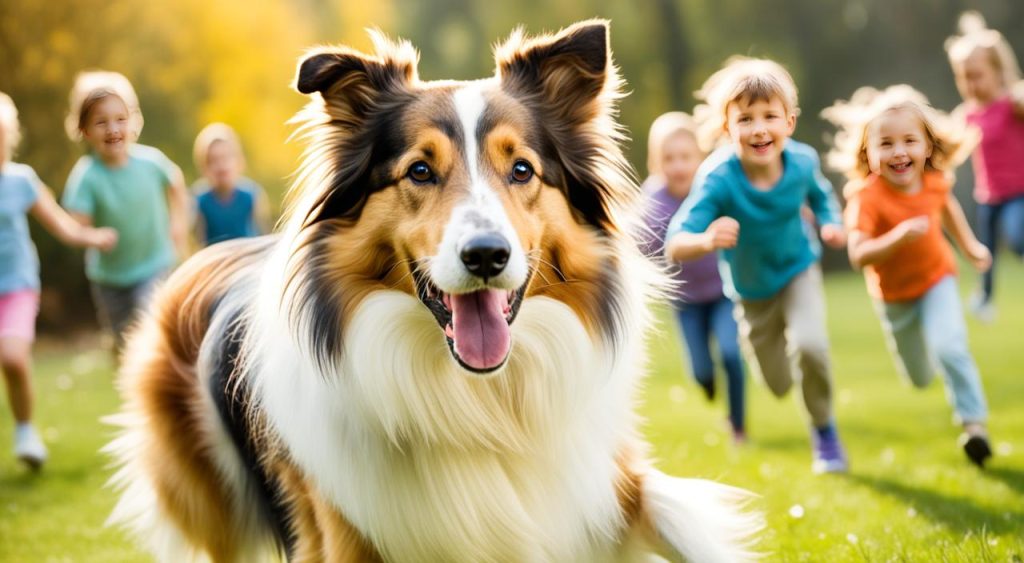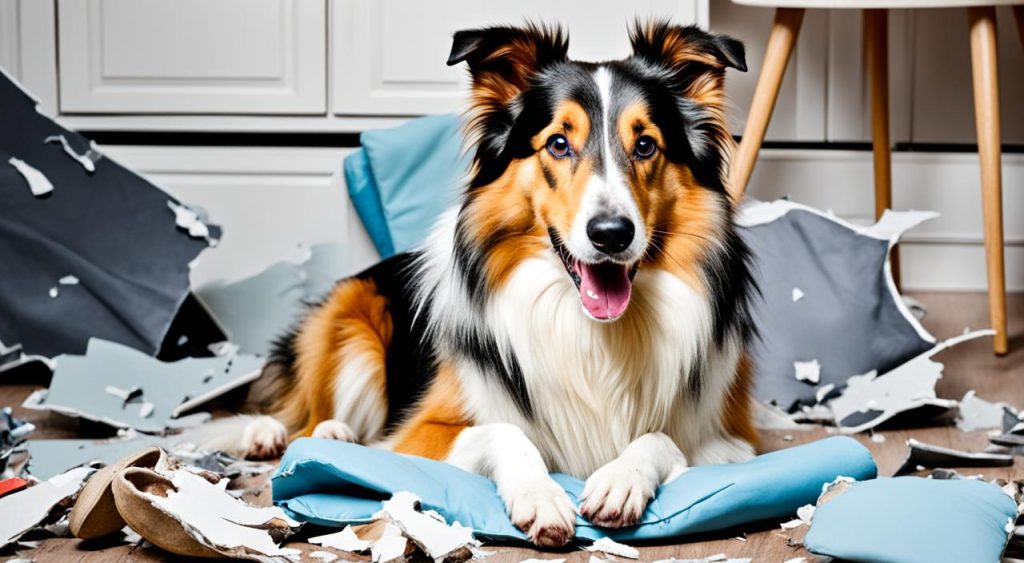Leaving your dog alone can be a source of concern for any pet owner, and Rough Collies are no exception. These beautiful and intelligent dogs have varying levels of independence, and how well they cope with being left alone depends on several factors. In this article, we will explore whether Rough Collies can stay home alone and provide you with tips on how to ensure their well-being when you’re away.
Key Takeaways:
- Rough Collies have varying levels of independence when it comes to staying home alone.
- Factors such as personality, training, and upbringing influence a Rough Collie’s ability to be left alone.
- Training, gradual desensitization, and establishing a routine can help improve a Rough Collie’s independence.
- Monitoring your Rough Collie’s behavior and providing mental and physical stimulation are crucial when they are alone.
- Alternate options such as doggy daycare and pet sitters can provide companionship and reduce anxiety.
Factors Affecting Rough Collie Independence
When it comes to the independence of Rough Collies, several factors come into play. Age, temperament, training, and socialization can significantly influence a Rough Collie’s ability to be independent. Understanding these factors is crucial for effectively fostering independence in your Rough Collie.
Firstly, age plays a role in a Rough Collie’s independence. Puppies and older dogs may struggle more with being left alone compared to adult dogs. The younger ones may still be adjusting to their surroundings and developing their coping mechanisms, while older dogs may experience separation anxiety due to changes in their health or routine.
Secondly, temperament also affects a Rough Collie’s ability to be independent. Some Rough Collies may naturally have a more self-sufficient temperament, while others may be more prone to separation anxiety. Understanding your Collie’s temperament will help you tailor your approach to training and socialization.
Training and socialization are two essential factors that can greatly impact a Rough Collie’s independence. Through proper training, you can teach your Collie how to cope with being alone and develop positive behaviors. Socialization plays a role in helping them feel comfortable in different environments and can boost their confidence when faced with independence.
By considering these factors and implementing appropriate training and socialization techniques, you can help your Rough Collie become more independent. This will not only benefit their overall well-being but also provide you with peace of mind when you need to leave them alone.
Tips for training Rough Collies to be more independent
To help your Rough Collie become more independent, there are several effective training strategies you can implement. These tips will gradually build their confidence, reduce separation anxiety, and foster a sense of self-reliance.
1. Gradual desensitization
Start by leaving your Rough Collie alone for short periods, gradually increasing the duration over time. This gradual exposure helps them become accustomed to being alone and teaches them that you will always return. Use positive reinforcement, such as treats and praise, to reward calm behavior during these sessions.
2. Establish a routine
Rough Collies thrive on predictability, so establish a consistent daily routine. This includes fixed times for meals, walks, playtime, and alone time. Having a structured routine helps them feel secure and understand when to expect your return.
3. Create a safe space
Designate a specific area in your home as your Rough Collie’s safe space, such as a crate or a cozy corner. Make this space comfortable and appealing, filled with their favorite toys, bedding, and a water bowl. This provides them with a retreat where they can relax and feel secure when you’re not around.
4. Provide mental and physical stimulation
Rough Collies are intelligent and active dogs, so it’s important to keep them mentally and physically stimulated. Engage them in activities like puzzle toys, obedience training, and interactive games. Regular exercise and walks also help release their energy and maintain their overall well-being.
5. Positive reinforcement
Use positive reinforcement techniques to reinforce desired behaviors. When your Rough Collie displays independence, calmness, and adaptability, provide praise, treats, or their favorite toy as a reward. This positive association helps them associate being independent with positive experiences.
By implementing these training tips, you can help your Rough Collie develop the skills and confidence to be more independent. Remember to be patient, consistent, and always reward their progress. With time and practice, your Rough Collie will become more self-assured and confident when left alone.
Ensuring the well-being of Rough Collies when left alone
Monitoring the behavior of Rough Collies when left alone is crucial for their well-being. It is important to pay attention to any signs of stress, anxiety, excessive barking, or destructive behavior, as these may indicate a need for intervention.
Providing entertaining toys can help keep Rough Collies engaged and mentally stimulated while they are alone. Interactive toys, puzzle toys, and treat-dispensing toys can provide hours of entertainment and prevent boredom.
Maintaining a consistent routine is also beneficial for Rough Collies when left alone. Dogs thrive on structure and having set times for activities such as feeding, exercise, and rest can help them feel secure and reduce anxiety.
Arranging for regular check-ins by someone trusted can provide reassurance for both you and your Rough Collie. Knowing that someone will be checking in on your pet and providing companionship can help alleviate any concerns you may have about leaving them alone.
“Consistency and mental stimulation are key in ensuring the well-being of Rough Collies when left alone. By providing them with engaging toys and maintaining a consistent routine, you can help prevent boredom and reduce anxiety. Regular check-ins by someone you trust can also provide reassurance and companionship.”
How long can Rough Collies be alone?
The ideal amount of time a Rough Collie can safely stay home alone varies depending on the individual dog. Generally, adult Rough Collies should not be left alone for more than four to six hours at a time. Puppies and senior dogs may require more frequent check-ins or shorter periods alone. It is crucial to monitor a Rough Collie’s behavior when left alone to ensure they are coping well and not experiencing any negative effects.
Alternatives to leaving Rough Collies alone
If leaving a Rough Collie alone for extended periods is a concern, there are alternatives to consider. These alternatives provide companionship, exercise, and supervision, ensuring that your Rough Collie’s needs are met even when you can’t be there:
Doggy daycare for Rough Collies: Enrolling your Rough Collie in a reputable doggy daycare facility can provide them with socialization, exercise, and constant supervision. This option ensures that your dog stays engaged and cared for in a safe environment.
Pet sitters for Rough Collies: Hiring a pet sitter or dog walker can offer companionship and exercise to your Rough Collie while you’re away. A trusted pet sitter can visit your home to take your Collie for walks, play with them, and provide the necessary care they need.
Working from home with Rough Collies: If your work allows it, working from home can minimize the time your Rough Collie spends alone. Being in the same space as you provides them with comfort and company throughout the day.
Family and friends for Rough Collies: Enlist the help of trusted family members, friends, or neighbors to provide companionship and care for your Rough Collie. This can involve having someone check in on your dog, take them for walks, or even pet-sit them in their own home, ensuring your Rough Collie receives the attention they need.
By exploring these alternatives, you can find the best solution that suits your Rough Collie’s needs and minimizes the time they spend alone. Remember, it’s important to prioritize your Rough Collie’s well-being and ensure they receive the care and attention they deserve.
Can Rough Collies run away?
Rough Collies, like any dogs, can have the tendency to run away if given the opportunity. It is essential to prevent escapes by ensuring that the yard is properly fenced and free of gaps or holes. Consider using a GPS tracking collar to quickly locate a Rough Collie in case they do run away.
History and Care of Rough Collies
Rough Collies have a fascinating history as herding dogs, known for their intelligence, agility, and loyalty. They gained significant popularity after being owned by Queen Victoria, who adored their beauty and gentle nature. Today, Rough Collies are treasured as loving family pets and continue to showcase their exceptional qualities in various roles.
When it comes to caring for Rough Collies, several important factors must be considered to ensure their well-being. One crucial aspect is providing them with daily exercise. Rough Collies are an active breed that thrives on physical activity, so regular walks, playtime, and mental stimulation are vital to keep them healthy and happy.
Grooming the Rough Collie’s coat is another essential part of their care routine. Their thick, long double coat requires regular brushing to prevent matting and keep it clean and healthy. Additionally, periodic bathing and trimming of the fur around the ears and paws help maintain their overall appearance.
Heartworm treatment is crucial for the health of Rough Collies. Like all dogs, they are susceptible to heartworm infection, a potentially life-threatening condition. Regular administration of prevention medication as recommended by a veterinarian is essential to protect them from heartworm disease.
Overall, Rough Collies make wonderful companions for families willing to provide them with the love, care, and attention they deserve. Their history as herding dogs and their inherent loyalty and intelligence make them a cherished breed that adapts well to a family environment.
Conclusion
In conclusion, the independence of Rough Collies varies depending on several factors. While some may be fine staying home alone for a few hours, others may struggle with anxiety or destructive behavior. Age, temperament, training, and socialization all play a role in a Rough Collie’s ability to be independent.
However, with proper training and precautions, most Rough Collies can be safely left alone for short periods. Gradual desensitization, establishing a routine, creating a safe space, providing mental and physical stimulation, and using positive reinforcement can help train them to cope with being alone.
It is important to ensure the well-being of Rough Collies when left alone. Monitoring their behavior, providing entertaining toys, maintaining a consistent routine, and arranging for regular check-ins can reduce anxiety and prevent boredom. Additionally, if leaving a Rough Collie alone for extended periods is a concern, there are alternatives to consider, such as doggy daycare, pet sitters, working from home, or enlisting the help of trusted family members or friends.
Ultimately, finding the right balance between a Rough Collie’s companionship needs and your own commitments is crucial for a happy and healthy relationship. By considering their history, providing proper care, and implementing the tips mentioned, you can ensure the well-being and independence of your Rough Collie.





